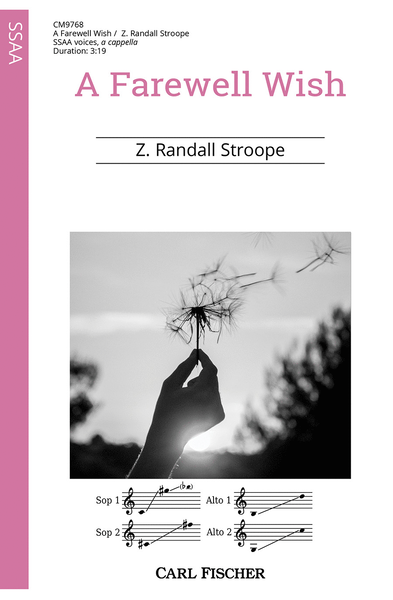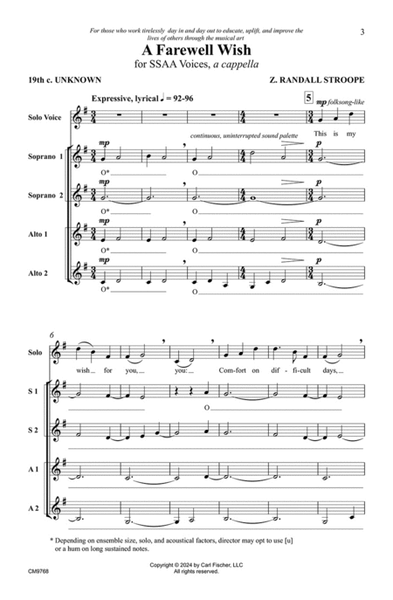A Farewell Wish
Details
Description
SKU: CF.CM9768
Composed by Z. Randall Stroope. Vocal Score. Duration 3 minutes, 19 seconds. Carl Fischer Music #CM9768. Published by Carl Fischer Music (CF.CM9768).ISBN 9781491160343. UPC: 680160923298. Key: G major. English.
About the WorkThe text of this work is most often attributed to Ralph Waldo Emerson, although it doesn't mirror his style, and no research credits an essay, book or letter with its source. Other individuals are occasionally suggested as possible authors, but equally unsubstantiated. Even whether the textis a "poem" or a "quote" seems unclear. But there is one thing that is without question: that this beloved text has inspired countless people and contributed toward a view of the world through eyes of hope, resilience, courage, beauty, and joy. Music for this text flowed more easily than about any text I have ever set. It has an emotional connection that is mystical, and after I read it for the first time, I immediately sat down and wrote this work without stop.Rehearsal NotesIn many cases, art is more expressive and reaches a wider range of human emotions when multiple artistic fields are fused together. Such is the case with choral music: the intertwining of literature, music, and very often dance, visual arts, and more. The "story" in choral music is often quite specific, much like film scoring. At times, the music is the picture frame (score) around the picture (text), while at others the music is the leading dramatic/emotional impetus.In the present case (My Farewell Wish), the text is sincere, innocent, heartfelt, and earnest. By all accounts, the message is altruistic, expressing selfless desire for another's present/future happiness. Capturing this message has a strong reliance on the performers to not only carry the emotional intent of the moment (a phrase of text or a measure), but the the energy and continuance of the message throughout.The use of the [o] vowel functions almost as instrumental interludes or underpinning of strings. The conductor may use the [o] as indicated in the score, or a [u] vowel, a hum (with [o] as the vowel inside the mouth), or all three at different times for different reasons. In an acoustical performance (no mic), the soloist and the ensemble are a reflection of each other's natural sound. And, even gentle, warm solo voices should have no trouble projecting.Two final thoughts: 1) the obbligato or added voice or two on high passages (m. 66) or a single note (final chord) will be best delivered by lyrical, pure voices with demonstrated control; and 2) the metronome marking of 80 bpm (mm. 1–81) was strongly considered and should be followed.About the ComposerZ. Randall Stroope is an American composer and conductor. His composition teachers were Normand Lockwood and Cecil Effinger, both students of the Nadia Boulanger, the famous French teacher (and student of Gabriel Fauré). Randall is the artistic director of two international summer music festivals, is an Honorary Board Member of the NationalAssociation of Italian Choral Directors, and has conducted in 25 countries. He has directed over 40 times at Carnegie Hall, and is a frequent conductor at other prestigious concert venues. Randall has 190 published works, and his music can be heard on Spotify, YouTube and other platforms, including his website (www.zrstroope.com).


 Share
Share